Reference: Rosenheim utilizing all benefits of smart waste management in paper waste collection
Smart waste management in paper waste collection
Project and customer description:
Rosenheim is a picturesque town in Bavaria, located approximately 50 kilometers south of Munich, with a population of around 60,000. Public services, including waste collection, are managed by the municipal company. In 2021, the town decided to start remotely monitoring the fill levels of trash bins using smart sensor technology. After evaluating different options, they chose ultrasonic sensors from Sensoneo, which were installed by Sensoneo’s integrator and partner, komro.
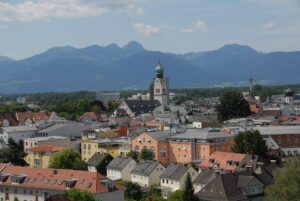
Challenge:
Stadtwerke Rosenheim, the municipal services company responsible for waste collection, was seeking a cost-effective solution to monitor the fill levels of paper waste bins, enabling them to collect these bins only when full and truly necessary, thereby avoiding unnecessary collection routes.
Solution:
1 year after implementation, 92 fill-level sensors deployed across 78 bin stands, monitoring paper waste, have proven their value by delivering financial, operational, and environmental benefits to the customer. komro Project Manager for implementing the system, Mr. Markus Heigl confirmed the easy setup: “It was easy to get the system up and running. komro had already set up a LoRa-Network at Rosenheim, that covered the whole city. So it was easy to integrate the Sensors from Sensoneo. The data connection to Sensoneo’s waste management system was also straightforward, thanks to the good cooperation with Sensoneo. Our customer was therefore able to quickly benefit from the results. For Rosenheim’s citizens, this smart waste management system enhances the overall cleanliness of recycling islands. Overflowing paper containers and delayed pickups will be a thing of the past, contributing to a tidier, more organized environment.”
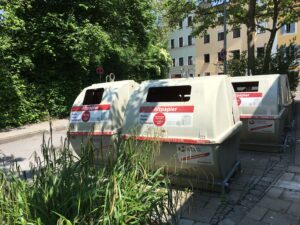
Key achievements:
For instance, this can be a role model for other waste collection companies in achieving an excellent average fill level at collection, which meets one of the primary goals of fill-level monitoring technology: avoiding the collection of half-empty or empty bins. Collecting bins only when it is truly necessary not only saves resources for customers, but also helps reduce emissions from waste vehicles and alleviates traffic congestion in the town. An 86% average fill level at collection is extraordinarily high, especially considering that the typical industry rate ranges between 40% and 70%.
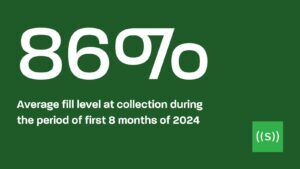
Impact:
Seeing the fill levels in the system is primarily the basis, but komro and their customer also benefit from the comprehensive data analytics included in the Waste Management System (WMS) platform, which gathers valuable data from the sensors. This offers more opportunities to optimize daily operations. Waste operators from Rosenheim can adjust the collection frequency based on how quickly or slowly the bins are filling. Alternatively, the user can relocate infrastructure from low-fill-rate areas to those with higher demand.


Another inspiring way how to leverage this data is through route planning, which is based on precise fill-level data from the sensors. This solution, which can optionally include a specialized Driver Navigation App, automates the management of waste collection routes based on precise, predefined data regarding waste collection vehicles, depots, and landfills or incineration sites. The goal is to ensure that every waste collection route is planned to maximize the utilization of your resources (fleet, personnel, and time) while minimizing the costs associated with the task. More efficient routes contribute to reducing the negative impacts of waste collection in Rosenheim like less noise pollution, lower air pollution, and reduced traffic congestion.

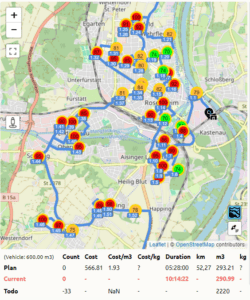
Future outlook:
Monitoring the fill levels of paper waste in Rosenheim, Germany, with the help of smart technology is one example of a data-driven approach, which is improving municipal services. Projects like this can serve as strong testimonials and motivation for other communities, proving that smart waste management works effectively even on a small scale, where technology is not deployed in hundreds or thousands of devices.
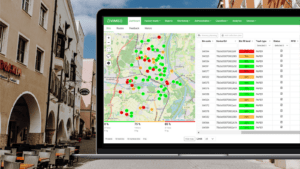
Partners:
komro: System integrator and reseller partner
Stadtwerke Rosenheim (SWRO): Municipal services

More references
We help customers manage waste smarter


